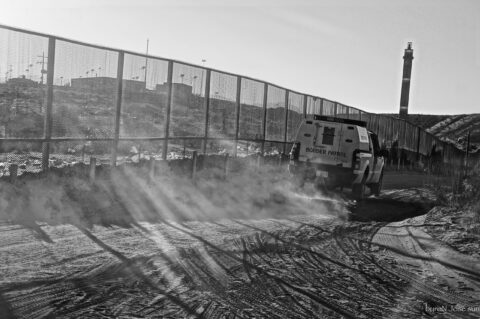Special Report

The President’s Discretion, Immigration Enforcement, and the Rule of Law
The President has the legal authority to make a significant number of unauthorized migrants eligible for temporary relief from deportation that would be similar to the relief available under the Deferred Action for Childhood Arrivals (DACA) program. Read More

Two Years and Counting: Assessing the Growing Power of DACA
This week marks the two-year anniversary of the Deferred Action for Childhood Arrivals (DACA) Program, first initiated by President Obama on June 15, 2012. This research brief presents current findings from the National UnDACAmented Research Project (NURP) national survey on the impact that DACA has had on some of the young people who have received it. Read More

Mexican and Central American Asylum and Credible Fear Claims: Background and Context
This paper addresses these issues, summarizes the concerns and experiences of numerous advocates in the field, and concludes that the credible fear and asylum process poses obstacles for applicants that far surpass the supposed abuses claimed by its detractors. Read More

No Action Taken: Lack of CBP Accountability in Responding to Complaints of Abuse
Of the 809 complaints of alleged abuse lodged against Border Patrol agents between January 2009 and January 2012, 97 percent resulted in “No Action Taken.” On average, CBP took 122 days to arrive at a decision when one was made. Read More

Living in Car Culture Without a License
Community leaders in the United States increasingly recognize the contributions of immigrants to the growth of state and local economies, in both traditional and new immigrant destinations, as immigrants help revitalize declining communities and ailing economies. In recognition of these contributions, states and cities across the country are creating welcoming initiatives that seek to integrate and maximize the contributions of immigrant workers and entrepreneurs of all backgrounds, without an emphasis on legal status. On a parallel track in terms of initiatives that facilitate the integration of foreign-born arrivals, some states offer driver’s licenses to unauthorized immigrants. Many more states are considering it. This makes sense given that the United States is among the top motor-vehicle dependent countries in the world. States that do not offer driver’s licenses to unauthorized immigrants will limit the contributions that immigrant communities as a whole can potentially make, are likely to face negative economic and public safety consequences, and tend to fail in attempts to use such restrictive state-level policies to reduce the presence of unauthorized immigrants. Read More

Health Worker Shortages & the Potential of Immigration Policy
Foreign-born and foreign-trained professionals play an important role in the delivery of health care in the United States. This report examines the important role of immigrant doctors and nurses – many of whom have received their training abroad – in the U.S. health industry, using new Census Bureau data as well as information from numerous interviews with health industry experts. Read More

Revitalization in the Heartland of America
A potent combination of declining population growth and economic stagnation has led many cities and metropolitan regions to rethink how to reinvigorate their communities. The Midwest is a prime example of this trend. According to the Chicago Council on Global Affairs, “the Midwest cannot hope to keep up with other regions or international competitors without a vital entrepreneurial sector.” The Council notes that “immigrants, risk takers by nature, are unusually successful entrepreneurs, more than twice as likely as native-born Americans to start their own firms.” As a result, immigration is one of the strategies to which communities are repeatedly turning to fuel economic growth. A budding place-based awareness of the important contributions that new and existing immigrants make to neighborhood revitalization is seen in the increasing number of cities pursuing a nexus of immigrant welcoming, integration, and economic development initiatives. In this report, we focus on the journeys of three places—two cities and one state—in their efforts to implement strategies for future economic success that depend on immigration. The initiatives are taking place against a backdrop of tepid progress toward comprehensive federal reform of the U.S. immigration system. Read More

The Faulty Legal Arguments Behind Immigration Detainers
In late June 2012, the Supreme Court struck down three provisions of Arizona’s SB 1070 and left a fourth vulnerable to future legal challenge. As has been well documented, the Court’s rejection of SB 1070 tipped the balance in favor of federal enforcement and away from state and local enforcement of the immigration laws. But this essay explores a less obvious consequence of the Court’s decision: its implications for the viability of a critical federal enforcement mechanism: the immigration “detainer.” An immigration detainer is a piece of paper that federal immigration officials send to state and local jails requesting that they continue holding an individual for up to 48 business hours after he or she would otherwise be released, so that agents of U.S. Immigration and Customs Enforcement (ICE) can investigate the person’s status and assume custody if necessary. Also known as immigration “holds,” detainers are the key enforcement mechanism behind federal enforcement initiatives like the Criminal Alien Program and Secure Communities. There has been considerable confusion as to whether a detainer is a mere request that ICE be notified of a suspected immigration violator’s impending release, or a command by ICE that state or local officials hold a prisoner for ICE beyond the time the prisoner would otherwise be released. Independent of that question, however, the Court’s decision in Arizona v. United States identifies a more fundamental problem: that detainers may violate the Constitution and federal statutes even when honored on a voluntary basis. Read More

Bordering on Criminal: The Routine Abuse of Migrants in the Removal System
This two-part series highlights the findings of the Migrant Border Crossing Study—a binational, multi-institution study of 1,110 randomly selected, recently repatriated migrants surveyed in six Mexican cities between 2009 and 2012. The study exposes widespread mistreatment of migrants at the hands of U.S. officials in the removal system. Part I: Migrant Mistreatment While in U.S. Custody This report focuses on the mistreatment of unauthorized migrants while in U.S. custody. Overall, we find that the physical and verbal mistreatment of migrants is not a random, sporadic occurrence but, rather, a systematic practice. One indication of this is that 11% of deportees report some form of physical abuse and 23% report verbal mistreatment while in U.S. custody—a finding that is supported by other academic studies and reports from non-governmental organizations. Another highly disturbing finding is that migrants often note they are the targets for nationalistic and racist remarks—something that in no way is integral to U.S. officials’ ability to function in an effective capacity on a day-to-day basis. Read More

Stepping Up: The Impact of the Newest Immigrant, Asian, and Latino Voters
This analysis of immigration trends and the demographic composition of U.S. House districts shows that numerous congressional districts have emerging electorates who have many reasons to care deeply about immigration reform. Read More
Make a contribution
Make a direct impact on the lives of immigrants.
